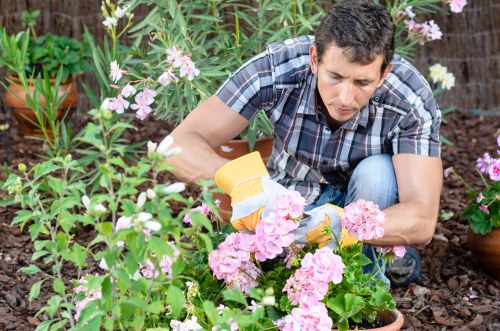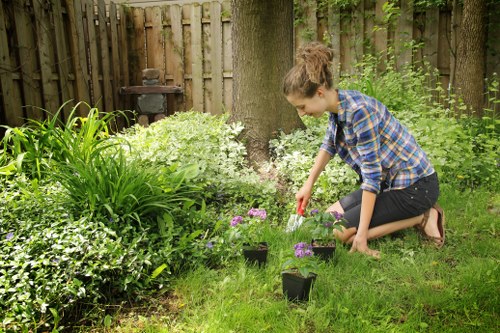Comprehensive Guide to Garden Maintenance in Forest Hill

Introduction to Garden Maintenance
Maintaining a beautiful garden in Forest Hill requires dedication, knowledge, and the right strategies. Whether you are a seasoned gardener or a novice, understanding the unique climate and soil conditions of Forest Hill is essential for thriving plants and a vibrant garden.
Forest Hill's temperate climate offers a conducive environment for a wide variety of plants. However, factors such as seasonal changes, pests, and soil quality can impact your garden's health. Proper maintenance ensures that your garden remains lush and healthy throughout the year.
In this guide, we will explore essential garden maintenance practices tailored specifically for Forest Hill. From soil preparation to pest control, we've got you covered.

Soil Preparation
Understanding Soil Types in Forest Hill
The foundation of any thriving garden is healthy soil. Forest Hill boasts a variety of soil types, including clay, sandy, and loamy soils. Each type requires specific preparation techniques to optimize plant growth.
Clay Soils: These soils retain water well but can become compacted, limiting root growth. To improve drainage and aeration, incorporate organic matter such as compost or well-rotted manure.
Sandy Soils: Sandy soils drain quickly but often lack essential nutrients. Enhancing these soils with organic compost and mulch will help retain moisture and provide necessary nutrients for plants.

Plant Selection and Care
Choosing the Right Plants for Forest Hill
Selecting plants that are well-suited to Forest Hill's climate is crucial for minimizing maintenance efforts and ensuring garden success. Here are some top choices:
- Perennials: Plants like lavender, hostas, and daylilies thrive in Forest Hill and require minimal upkeep.
- Annuals: For vibrant, seasonal color, consider marigolds, petunias, and zinnias.
- Vegetables: Tomatoes, peppers, and lettuce are excellent choices for vegetable gardens in this region.
Additionally, incorporating native plants can enhance biodiversity and reduce the need for excessive watering and fertilization.

Watering Strategies
Efficient Irrigation Techniques
Proper watering is pivotal in garden maintenance. Overwatering or underwatering can lead to plant stress and disease. Here are some effective strategies:
- Drip Irrigation: This system delivers water directly to the plant roots, reducing evaporation and ensuring efficient water use.
- Soaker Hoses: Ideal for garden beds, soaker hoses provide slow, consistent watering, promoting deep root growth.
- Rainwater Harvesting: Collecting rainwater can be an eco-friendly way to water your garden while conserving municipal water resources.
Implementing these techniques not only conserves water but also promotes healthier plant growth.

Pest and Disease Management
Protecting Your Garden
Pests and diseases can quickly undermine your gardening efforts. Effective management involves regular monitoring and proactive measures:
- Regular Inspections: Frequently check plants for signs of pests or disease to address issues before they escalate.
- Natural Predators: Encourage beneficial insects like ladybugs and predatory beetles that naturally control pest populations.
- Organic Treatments: Use environmentally friendly pesticides and fungicides to manage infestations without harming beneficial organisms.
Maintaining garden hygiene by removing diseased plant material and keeping the area free of debris also helps in preventing pest and disease outbreaks.
Pruning and Trimming
Maintaining Plant Health
Regular pruning and trimming are essential for promoting healthy growth and maintaining the desired shape of your plants. Here's how to approach it:
- Pruning Timing: Different plants have specific pruning seasons. Research the best times to prune each type of plant in your garden.
- Tools and Techniques: Use clean, sharp tools to make precise cuts, reducing the risk of damage and disease.
- Remove Dead or Diseased Branches: This prevents the spread of diseases and allows the plant to focus energy on healthy growth.
Proper pruning enhances air circulation, sunlight penetration, and overall plant vitality.
Mulching and Weed Control
Enhancing Soil Health
Mulching is a fundamental aspect of garden maintenance, offering numerous benefits:
- Moisture Retention: Mulch helps retain soil moisture, reducing the frequency of watering.
- Weed Suppression: A layer of mulch inhibits weed growth, minimizing competition for nutrients and water.
- Temperature Regulation: Mulch acts as an insulating layer, protecting plant roots from extreme temperatures.
Organic mulches such as bark, straw, and compost not only provide these benefits but also enrich the soil as they decompose.

Seasonal Maintenance Tasks
Adapting to Forest Hill's Climate
Each season brings unique maintenance requirements to keep your garden thriving:
- Spring: Focus on soil preparation, planting new seeds, and pruning early-blooming plants.
- Summer: Maintain consistent watering, monitor for pests, and provide shade for plants as needed.
- Autumn: Clean up fallen leaves, plant winter vegetables, and prepare the garden for colder months.
- Winter: Protect sensitive plants from frost, prune dormant trees, and plan for the upcoming gardening season.
Adapting your maintenance routine to seasonal changes ensures year-round garden health and beauty.

Lawn Care
Maintaining a Green Lawn
A well-maintained lawn enhances the overall aesthetic of your garden. Key lawn care practices include:
- Mowing: Regular mowing at the appropriate height promotes dense grass growth and prevents weed encroachment.
- Fertilizing: Apply suitable fertilizers to provide essential nutrients, fostering a lush and resilient lawn.
- Aeration: Periodic aeration relieves soil compaction, improving root growth and water infiltration.
Proper lawn care not only contributes to the garden's beauty but also supports overall ecosystem health by providing habitat for beneficial insects.
Irrigation Systems
Automating Your Watering Needs
Installing an efficient irrigation system can significantly reduce the time and effort required for watering your garden:
- Automatic Sprinklers: Ideal for large lawns and open garden areas, sprinklers ensure even water distribution.
- Drip Systems: Perfect for flower beds and vegetable gardens, drip systems target water directly to plant roots.
- Smart Controllers: These devices adjust watering schedules based on weather conditions, optimizing water usage.
Investing in a quality irrigation system enhances water efficiency and promotes healthier plant growth with minimal manual intervention.

Garden Tools and Equipment
Essential Tools for Effective Maintenance
Having the right tools is crucial for efficient garden maintenance. Here are some must-have tools for Forest Hill gardeners:
- Pruners and Shears: For precise pruning and trimming of plants.
- Garden Gloves: Protect your hands from thorns, dirt, and potential injuries.
- Spade and Shovel: Essential for digging, planting, and soil amendment tasks.
- Rake: Useful for clearing debris and leveling soil or mulch.
- Watering Can or Hose: For manual watering needs where irrigation systems are not feasible.
Maintaining your garden tools by cleaning and storing them properly extends their lifespan and ensures they perform effectively when needed.

Composting
Sustainable Garden Practices
Composting is an eco-friendly way to recycle garden and kitchen waste, transforming it into nutrient-rich soil conditioner:
- Types of Compost: Choose between hot composting, which decomposes materials quickly with regular turning, and cold composting, which requires less maintenance but takes longer.
- Materials: Combine green materials (vegetable scraps, grass clippings) with brown materials (dry leaves, cardboard) to create a balanced compost pile.
- Maintenance: Keep the compost moist and aerated by turning it regularly, facilitating efficient decomposition.
Using compost in your garden enhances soil structure, improves moisture retention, and provides essential nutrients for plants, promoting a healthy and sustainable garden ecosystem.

Seasonal Planting Tips
Maximizing Garden Productivity
Strategic planting throughout the seasons ensures continuous garden productivity and beauty:
- Spring Planting: Focus on hardy vegetables, early-blooming flowers, and perennials that thrive in cooler temperatures.
- Summer Planting: Opt for heat-tolerant plants, provide adequate shading, and ensure consistent watering to support growth during warmer months.
- Autumn Planting: Plant bulbs for spring blooms, prepare beds for winter, and grow cool-season vegetables.
- Winter Planting: Utilize evergreen plants, protect sensitive species from frost, and plan for the next growing season.
By aligning your planting schedule with seasonal conditions, you can maintain a vibrant and productive garden all year round.
Pest-Resistant Plants
Reducing Pest Problems Naturally
Incorporating pest-resistant plants into your garden can naturally deter common pests and reduce the need for chemical interventions:
- Marigolds: Emit a scent that repels nematodes and other soil-borne pests.
- Lavender: Deters moths, fleas, and other unwanted insects with its strong fragrance.
- Basil: Keeps flies and mosquitoes at bay while enhancing the flavor of nearby vegetables.
- Nasturtiums: Attract aphids away from other plants, acting as a trap crop.
Integrating these plants into your garden not only enhances its beauty but also provides a natural defense against pests.

Garden Lighting
Enhancing Aesthetic and Functionality
Proper lighting can transform your garden, making it a welcoming space during evenings and highlighting its beauty:
- Pathway Lights: Illuminate walkways to ensure safety and guide visitors through your garden.
- Spotlights: Highlight specific plants, trees, or garden features, creating visual interest after dark.
- String Lights: Add a cozy and festive atmosphere to seating areas or pergolas.
Using energy-efficient lighting options like LED fixtures can reduce electricity consumption while providing lasting illumination.

Garden Furniture and Accessories
Creating a Comfortable Outdoor Space
Incorporating furniture and accessories enhances the usability and aesthetic appeal of your garden:
- Seating: Invest in comfortable chairs, benches, or hammocks for relaxing and enjoying your garden.
- Decorative Elements: Add elements like fountains, sculptures, or garden art to personalize your space.
- Storage Solutions: Use garden storage benches or sheds to keep tools and supplies organized and accessible.
A well-furnished garden invites more frequent use and becomes a cherished outdoor retreat.

Organic Gardening Practices
Promoting a Healthy Ecosystem
Adopting organic gardening practices contributes to environmental sustainability and healthier plant growth:
- Natural Fertilizers: Use compost, manure, and other organic fertilizers to enrich the soil without harmful chemicals.
- Biological Pest Control: Encourage beneficial insects and birds that naturally manage pest populations.
- Crop Rotation: Rotate plant families annually to prevent soil depletion and reduce disease incidence.
Organic practices not only produce healthier plants but also support a diverse and balanced garden ecosystem.

Eco-Friendly Garden Practices
Sustainable Maintenance Tips
Embracing eco-friendly practices in your garden maintenance routine benefits both your garden and the environment:
- Rainwater Collection: Harvest rainwater to reduce reliance on municipal water sources and provide natural irrigation.
- Composting: Recycle organic waste into nutrient-rich compost, minimizing landfill contributions and enhancing soil health.
- Native Plant Selection: Choose native species that are adapted to the local climate, requiring less water and care.
Implementing these sustainable methods fosters a harmonious relationship between your garden and the surrounding ecosystem.

Garden Pest Prevention
Strategies for a Healthy Garden
Preventing pest infestations is more effective and less costly than dealing with them after they've occurred. Here are some preventive measures:
- Healthy Soil: Maintaining fertile soil helps plants resist pests and diseases naturally.
- Proper Spacing: Avoid overcrowding plants to ensure adequate air circulation, reducing the likelihood of fungal infections.
- Regular Maintenance: Stay on top of garden upkeep by removing weeds and dead plant material that can harbor pests.
By proactively managing these factors, you can minimize pest-related issues and maintain a healthy garden environment.
Tree Care
Maintaining Healthy Trees in Your Garden
Trees are integral to garden aesthetics and ecosystem balance. Proper tree care ensures their longevity and health:
- Pruning: Regularly trim branches to remove dead or diseased wood, promoting strong and healthy growth.
- Mulching: Apply mulch around the base of trees to conserve moisture and regulate soil temperature.
- Watering: Ensure young trees receive adequate water, especially during dry periods.
Caring for trees not only enhances their beauty but also provides shade, habitat for wildlife, and improved air quality.

Maintaining Garden Paths and Walkways
Enhancing Accessibility and Aesthetics
Well-maintained paths and walkways contribute to both the functionality and visual appeal of your garden:
- Material Selection: Choose durable and attractive materials such as gravel, brick, or natural stone that complement your garden's style.
- Regular Cleaning: Keep paths free of debris, moss, and weeds to ensure safe and pleasant walking surfaces.
- Edge Definition: Define the edges of walkways with edging materials to prevent overgrowth and maintain a neat appearance.
Maintaining clear and inviting pathways encourages exploration and enjoyment of your garden space.

Garden Safety Tips
Ensuring a Safe Outdoor Environment
Safety is paramount in garden maintenance. Implement these tips to create a secure and hazard-free garden:
- Tool Storage: Store garden tools safely to prevent accidents and keep them in good condition.
- Proper Lighting: Illuminate paths and work areas to prevent trips and falls, especially at night.
- Chemical Handling: Use pesticides and fertilizers responsibly, following label instructions and wearing protective gear.
By prioritizing safety, you ensure that your gardening activities are enjoyable and injury-free.

Garden Design and Layout
Creating an Organized and Beautiful Space
A well-designed garden layout enhances both functionality and aesthetics. Consider the following elements:
- Plant Arrangement: Group plants with similar water and light requirements together for easier maintenance.
- Focal Points: Incorporate features such as statues, fountains, or seating areas to draw attention and create visual interest.
- Pathways and Borders: Define sections of your garden with paths and borders to create structure and guide movement.
Thoughtful garden design not only makes maintenance more manageable but also creates a harmonious and inviting outdoor space.

Climate Considerations in Forest Hill
Adapting to Local Weather Patterns
Understanding and adapting to Forest Hill's climate is key to successful garden maintenance:
- Temperature Fluctuations: Prepare for seasonal temperature changes by selecting appropriate plant varieties and adjusting care routines accordingly.
- Rainfall Patterns: Utilize efficient watering systems and plan for periods of heavy rain or drought to maintain garden health.
- Frost and Snow: Protect sensitive plants during frost and snow events with covers, mulches, or strategic placement.
By aligning your maintenance practices with local climate conditions, you can ensure that your garden remains resilient and vibrant throughout the year.

Professional Garden Maintenance Services
When to Seek Expert Help
While DIY garden maintenance is rewarding, there are times when professional assistance can make a significant difference:
- Complex Landscaping Projects: For intricate designs or large-scale projects, professional landscapers can provide expertise and efficiency.
- Tree Care: Specialized arborists have the skills to manage tree health and address issues safely.
- Pest and Disease Control: Experts can accurately diagnose and treat pest and disease problems, ensuring effective solutions.
- Seasonal Maintenance: Professionals can handle seasonal tasks such as mulching, pruning, and planting, saving you time and effort.
Partnering with professional garden maintenance services in Forest Hill ensures high-quality care and a flourishing garden.
Contact us today to book your garden maintenance service and transform your outdoor space into a vibrant, healthy oasis.
